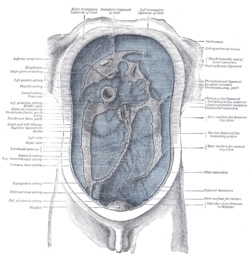Peritoneal recesses (or peritoneal gutters) are the spaces formed by peritoneum draping over viscera.[1]
| Peritoneal recesses | |
|---|---|
 Diagram devised by Delépine to show the lines along which the peritoneum leaves the wall of the abdomen to invest the viscera. | |
| Anatomical terminology |
The term refers mainly to four spaces in the abdominal cavity; the two paracolic gutters and the two paramesenteric gutters. There are other smaller recesses including those around the duodenojejunal flexure, cecum, and the sigmoid colon. These gutters are clinically important because they allow a passage for infectious fluids from different compartments of the abdomen. For example; fluid from an infected appendix can track up the right paracolic gutter to the hepatorenal recess.
The four peritoneal recesses are:
- The left and right paracolic gutters.
- The left and right paramesenteric gutters.
Duodenal recesses
editTo the left side of the duodenojejunal flexure, recesses or fossae may be created by peritoneal folds.[2]
The paraduodenal recess proper is situated posterior to the superior exremity of the inferior mesenteric vein. This paraduodenal recess is clinically and surgically important: an internal hernia portruding into the recess may obstruct the inferior mesenteric vein or cause a thrombus to form within it, and the vein may be sectioned during surgical repair of such a hernia.[2]
A superior and an inferior duodenal recess may be created by horizontal peritoneal folds.[2]
A retroduodenal recess may occur posterior to the duodenojejunal flexure.[2]
The small intestine may herniate (a condition known as an "internal hernia") into these recesses, and such hernias may then strangulate.[3]
See also
editReferences
edit- ^ "7. Male pelvis MRI #2, midsagittal plane". Radiology Atlas. SUNY Downstate Medical Center. Archived from the original on 26 October 2007. Retrieved 2009-12-15.
- ^ a b c d Sinnatamby CS, Last RJ (2011). Last's Anatomy (12th ed.). p. 254. ISBN 978-0-7295-3752-0.
- ^ Nandagopalan PA, Job C, Prasanna MB (November 2016). "Peritoneal Recesses of Human Duodenum". Journal of Clinical and Diagnostic Research. 10 (11): AJ01–AJ02. doi:10.7860/JCDR/2016/20395.8829. PMC 5198309. PMID 28050356.
External links
edit- Anatomy photo:37:14-0100 at the SUNY Downstate Medical Center — "Abdominal Cavity: Peritoneal Gutters" page 1
- Anatomy photo:37:14-0200 at the SUNY Downstate Medical Center — "Abdominal Cavity: Peritoneal Gutters" page 2
- Anatomy photo:37:14-0300 at the SUNY Downstate Medical Center — "Abdominal Cavity: Peritoneal Gutters" page 3